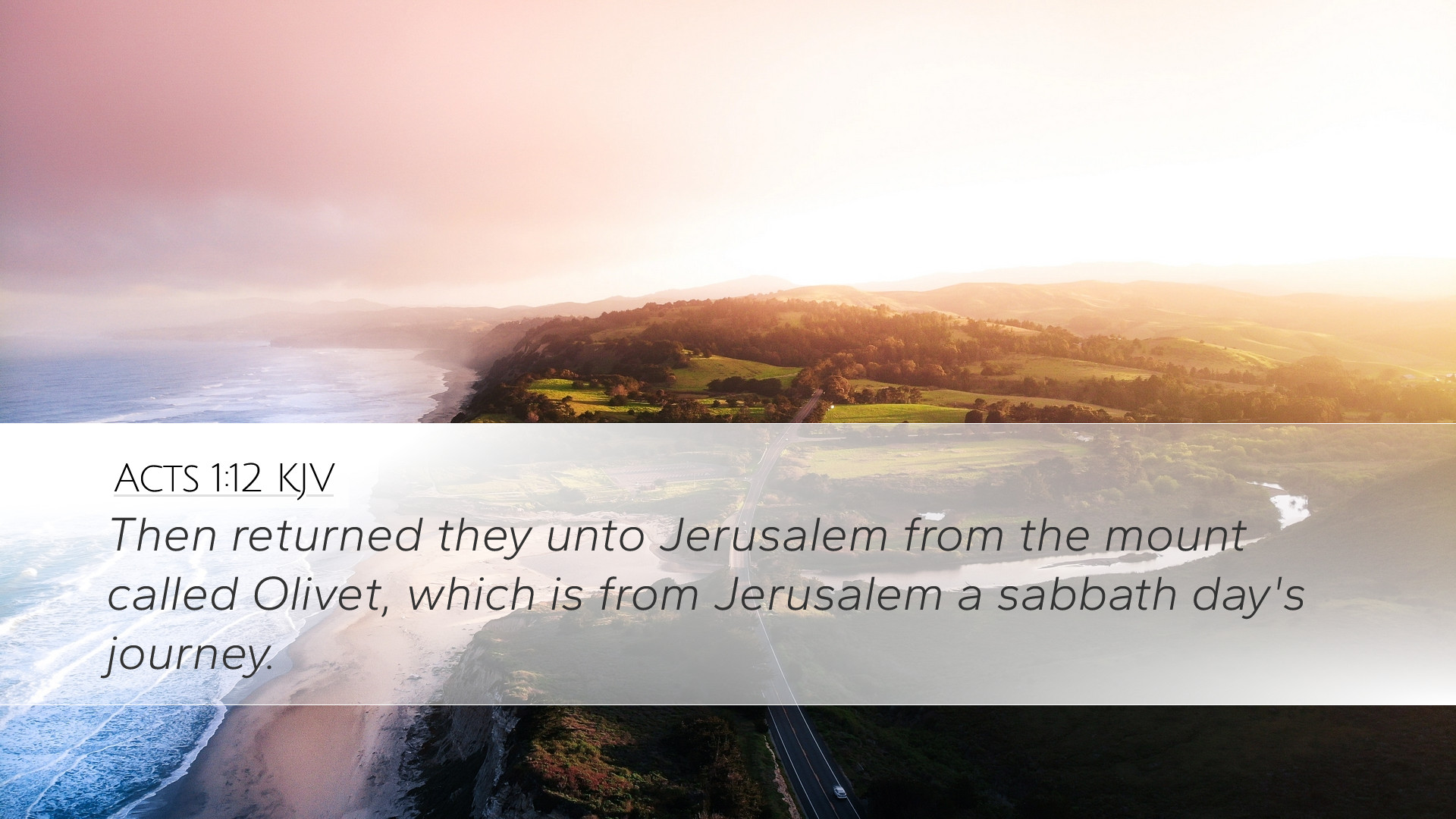Old Testament
Genesis Exodus Leviticus Numbers Deuteronomy Joshua Judges Ruth 1 Samuel 2 Samuel 1 Kings 2 Kings 1 Chronicles 2 Chronicles Ezra Nehemiah Esther Job Psalms Proverbs Ecclesiastes Song of Solomon Isaiah Jeremiah Lamentations Ezekiel Daniel Hosea Joel Amos Obadiah Jonah Micah Nahum Habakkuk Zephaniah Haggai Zechariah MalachiActs 1:12
Acts 1:12 KJV
Then returned they unto Jerusalem from the mount called Olivet, which is from Jerusalem a sabbath day's journey.
Acts 1:12 Bible Commentary
Commentary on Acts 1:12
Verse Text: "Then they returned to Jerusalem from the mount called Olivet, which is near Jerusalem, a Sabbath day's journey away."
Introduction
Acts 1:12 marks a pivotal transition in the narrative of the early church, following the ascension of Jesus Christ. This passage not only situates the apostles' actions geographically but also reflects their spiritual journey and obedience to Christ's instructions. Understanding this verse requires a blend of historical context, theological implications, and practical applications. Below, we delve into insights from several notable public domain commentaries.
Contextual Background
Prior to this verse, we witness the ascension of Jesus (Acts 1:9-11). The location of Olivet, or the Mount of Olives, is significant both geographically and theologically. The proximity to Jerusalem emphasizes the disciples' connection to the heart of Jewish faith and the fulfillment of Jesus' promise regarding the coming of the Holy Spirit.
Commentary Insights
-
Matthew Henry's Commentary
Matthew Henry notes that the apostles, upon witnessing Jesus' ascension, returned to Jerusalem in accordance with His command. Their journey from the Mount of Olives—“a Sabbath day's journey”—highlights not just the physical distance but also their readiness to gather for prayer and wait for the Holy Spirit (Acts 1:4, 14). Henry emphasizes their devotion and unity in this act, which foreshadows the communal nature of the early church.
-
Albert Barnes' Notes on the Bible
Albert Barnes enhances our understanding by explaining the cultural significance of a "Sabbath day's journey." This distance (approximately 2,000 cubits or about 3,000 feet) reflects Jewish law that limited travel on the Sabbath. This detail illustrates their observance of the Law and their commitment to prayer and fellowship. Barnes indicates that returning to Jerusalem symbolized their acceptance of their role in evangelizing and awaiting the promised Spirit.
-
Adam Clarke's Commentary
Adam Clarke provides a thorough exploration of the Mount of Olives's significance, highlighting its importance as a place of prayer and revelation in Jesus' ministry. Clarke suggests that the apostles’ return signals a stage in their transformation from followers to leaders within the nascent church. He argues that this passage serves as a reminder of the importance of obedience and the role of prayer in receiving divine guidance, especially as the apostles awaited the Holy Spirit.
Theological Implications
This verse encapsulates a moment of expectancy. The obedience of the apostles showcases their belief in Jesus's promises. Theologically, it serves as a reminder that the church is built upon obedience to divine instruction, awaiting the empowering presence of the Holy Spirit, which is a continual theme throughout Acts. The significance of prayer and community is foundational, as they prepare for the coming mission.
Practical Applications
For pastors, students, and theologians, Acts 1:12 serves multiple applications:
- Obedience: The disciples demonstrate that following Christ's commands, even when the way ahead is uncertain, is vital for spiritual growth and success in ministry.
- Community and Unity: The gathering ahead of the Pentecost underlines the importance of collective prayer and support within the church. This serves as a model for congregational life today.
- Expectancy of the Holy Spirit: They were not only passive followers; their return marks the anticipation of active participation in the unfolding of God’s mission, reminding modern believers to also expect and seek the Holy Spirit in their lives.
Conclusion
Acts 1:12 is a succinct yet profound verse, encapsulating themes of obedience, community, prayer, and expectation for divine empowerment. By returning to Jerusalem from the Mount of Olives, the apostles exemplify a transition that is not merely geographical but deeply spiritual. As we reflect on this passage, we are encouraged to consider our own journeys of faith, our communal practices, and our longing for the Holy Spirit's guidance.


